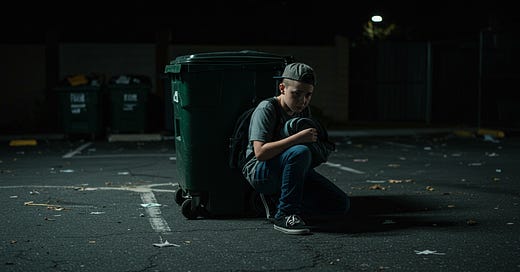Editor’s Note:
In this issue, we have a great video from Dottie concerning so-called runaway children. She emphasizes that they are in just as much danger as if they were abducted. This is article #24 of her book and guide 55 THINGS PARENTS & GRANDPARENTS SHOULD KNOW ABOUT HUMAN TRAFFICKING.
Lv,
Dottie & Larry
24. Runaways are at the same risk as if they had been abducted, but often they not identified as being in danger.
In her powerful "55 Things Parents and Grandparents Should Know" series, child safety expert Dottie Laster addresses a critical misconception about missing children that has persisted for decades. Point #24 highlights an urgent truth that every parent, law enforcement officer, and community member needs to understand: children labeled as "runaways" face the same level of danger as abducted children, yet they often don't receive the same urgent response.
A Dangerous Misconception That Hasn't Changed
"That has been the case all along," Laster explains, referencing cases from the 1970s where murdered children were dismissed by police as having "just run away." In some tragic instances, these children "were held in a serial killer's home for a period of time and then murdered, whereas if they had been looked at as in danger, maybe even their friends interviewed, they could have been found and maybe saved."
What's most alarming is that this dangerous pattern continues today. "Nothing's changed," Laster emphasizes. "That was 1970. [Now it's] 2025. I just worked a case last week from that same jurisdiction where the police were telling the parents 'Please run away, we got more important things to do.'"
Every Missing Child Is in Danger
Laster is adamant about one critical point: "Any kid that's not where they're supposed to be is in danger, no matter how they left, no matter if they walked out on their own whistling 'I'm going to Disneyland'—especially they're in danger."
The stark contrast in response between different types of missing children cases is troubling. When a child is visibly abducted—"thrown in a van and driven off"—there's typically an immediate response with "videos looked at, police response" and cases resolved "rather quickly."
However, children who have been methodically "lured and groomed, especially online" by predators face equal or greater danger, yet their cases often receive less urgent attention. What makes these situations particularly insidious is that "the kid doesn't know it," Laster points out. "The kid doesn't have the life experience to understand they're being manipulated, to know they've been tricked and lured and groomed and deceived."
Breaking the Pattern
Laster offers clear advice for parents facing this nightmare scenario: "When your kid's missing, don't let anyone say they just ran away. Don't let anyone say we have more important things to do. They're in danger every time."
Her own approach demonstrates how this shift in perspective can save lives. In the recent case she mentioned, Laster "was able to light a fire under authorities where it needed to be lit," which led to finding the missing child "within a day—a day where he'd been missing for a long period of time." She points out that "once they looked at it from a police perspective as some crime occurring, they were awesome, and that's what we need to always do."
A Call to Action
Laster refuses to use the term "runaway," instead focusing on the reality of the situation: "Did you interview him? How do you know? How do you know he's not in danger?"
Her message to parents is clear: be persistent, be advocates for your children, and never accept dismissive responses when your child is missing. "Nothing's more important than our kids, not ever," she insists. "And there's no future if we don't have our children or if we let them be so destroyed that they can't function."
The solution requires partnership between parents and authorities. As Laster concludes, "Don't let police just put them in a file. Help them and make them help you. It's a team effort—you and them—find these children."
By changing how we view and respond to missing children cases, regardless of how they disappeared, we can better protect those who need our help most.






https://www.aclu.org/news/immigrants-rights/fact-checking-family-separation